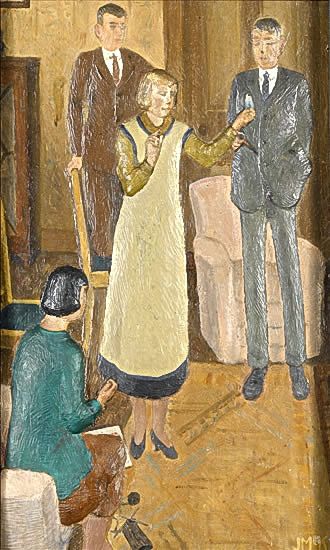

John McKenzie (1897 - 1972):
Figures in a Sitting Room with Budgerigar, circa 1930
Framed (ref: 548)
Signed with initials
Polychrome carved wood, in the original oak frame,
15 x 9 1/2 in. (38 x 24 cm.)
See all works by John McKenzie carved/relief True to Life catalogue
Provenance: The artists personal collection until 1972; the artist's housekeeper; thereafter by descent
Literature: John McKenzie, Liss Fine Art 2012, Cat. 17;
Patrick Elliot & Sacha Llewellyn; True to Life, British Realist Painting in the 1920s & 1930s, July 2017, ISBN 978 1 911054 05 4, Cat. 58, page103.
‘I keep on drawing and re-drawing until what I’ve produced simply asks to be carved’ (John McKenzie, Abroath Herald, 1 February 1963).
The remarkable work of John McKenzie has only recently come back to light. Despite exhibiting his slates at the Royal Scottish Academy Summer Exhibition, the Royal Glasgow Institute of Fine Arts, and in two solo exhibitions at the Public Library in his home town of Abroath, he had no interest in the commercial aspects of his work and sold no more than a handful of sculptures during his lifetime. Using Welsh slate, and working with engraver’s tools, he produced three to four reliefs a year, which amounted to less than a hundred in his entire career.
By day a charge-hand messman on HMS Condor (and later a railwayman), the reclusive McKenzie indulged his passion for carving by night and at the weekends. Producing in equal number scenes of contemporary life and scenes of antiquity, it is especially in the former that he found his most distinctive voice. His images, whether the carved wooden reliefs of the 1930s, or works in slate that date from the late 1930s, are rich in symbolism, which though often obscure is always engaging.
Liss Fine Art are currently preparing a catalogue of his work.
We are grateful to Paul Viney for assistance.
‘I keep on drawing and re-drawing until what I’ve produced simply asks to be carved’ (John McKenzie, Abroath Herald, 1 February 1963).
The remarkable work of John McKenzie has only recently come back to light. Despite exhibiting his slates at the Royal Scottish Academy Summer Exhibition, the Royal Glasgow Institute of Fine Arts, and in two solo exhibitions at the Public Library in his home town of Abroath, he had no interest in the commercial aspects of his work and sold no more than a handful of sculptures during his lifetime. Using Welsh slate, and working with engraver’s tools, he produced three to four reliefs a year, which amounted to less than a hundred in his entire career.
By day a charge-hand messman on HMS Condor (and later a railwayman), the reclusive McKenzie indulged his passion for carving by night and at the weekends. Producing in equal number scenes of contemporary life and scenes of antiquity, it is especially in the former that he found his most distinctive voice. His images, whether the carved wooden reliefs of the 1930s, or works in slate that date from the late 1930s, are rich in symbolism, which though often obscure is always engaging.
Liss Fine Art are currently preparing a catalogue of his work.
We are grateful to Paul Viney for assistance.
 Last Romantics
Last Romantics SOLD
SOLD



